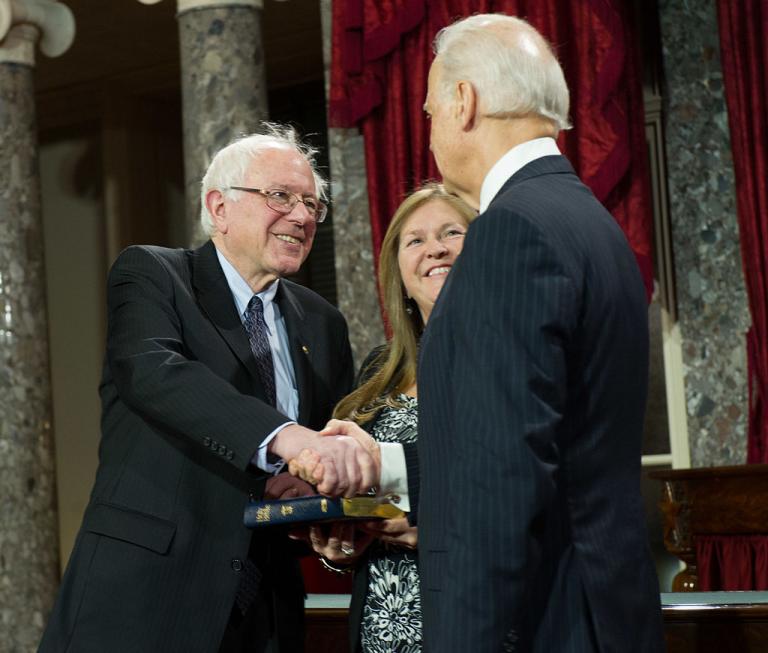All the Democrats have to do to defeat Donald Trump is to hold onto the states won by Hillary Clinton and flip the historically-Democratic rust belt states of Wisconsin, Michigan, and Pennsylvania that went for Trump. That means winning over white blue collar voters, which used to be the party base but which has been supplanted by affluent liberals and the activists of identity politics. Beating Trump is quite doable–unless Democrats, while denouncing Trump’s extremism and divisiveness, nominate a Trump figure of their own.
The Democratic Party so far has been lurching towards the far left. But among primary voters, the”woke” intersectionalists fixated on race, feminism, and LGBT issues are outnumbered 2-1 by “less educated” rank-and-file Democrats, who still like the traditional party of the New Deal and the union halls. Also, only 19-25% of Democratic voters consider themselves “very liberal,” with the rest considering themselves to be “moderate”or even “conservative.”
Strangely, none of the existing candidates seem to be targeting those primary voters, though they are the natural constituency of long-time Democratic politician Joe Biden. Which explains why the polls show him to be currently the front runner with 30% of early primary voters. And yet the more radical activists have lots of clout beyond their numbers. Socialist Bernie Sanders is in second place with 24%. His strength is that he is a radical who also appeals to white blue collar Democrats. The rest of the candidates running are in the single digits, but if you add them together they come to some 38%, enough potentially to secure a nomination if some of these candidates drop out and their supporters coalesce around an alternative.
The identity politics faction is dead set against nominating a white male. Some are complaining about the gay candidate, Pete Buttigieg, saying that he is just another white male after all, and that gay men experience less discrimination than blacks or women. This shows the internal contradictions of intersectional ideology. But it also heralds the possibility of major conflict within the Democratic party.
Here are my thoughts about some of the 18 Democratic Presidential candidates so far. Tell me what you think in the comments.
Joe Biden: Gafffe-prone. Light-weight. But he comes across as normal. An old-school Democrat. He has built up a lot of good will among union types and among African-Americans as Obama’s Vice-President. His long-time habit of “invading women’s personal space” to touch their shoulders and smell their hair is indeed creepy–read this for why it’s so bad–and while I don’t think it will be a dealbreaker for his supporters, it will be another reason for feminists to do whatever it takes to stop him. The new Democrats will consider him too old, too male, too traditional, too old-school liberal, and not with it in the age of identity politics. But the old Democrats might nominate him anyway, to the fury of the activists. Can he get the nomination? Yes. Possibly. Can he beat Trump? Yes. Possibly.
Bernie Sanders: If you want real, economic, workers-of-the-world-unite socialism–rather than the upper middle class, affluent, identity-politics version–he’s your guy. He even uses the R-word (Revolution). He has strong appeal to the working class that turned out for Trump. Also rural populists. And because of his radical credentials, he appeals to some of the new Democrats, though his brand of old school class-based Marxism is very different from post-Marxist identity politics. Some of those activists resent him for being male, white, and old. But they would go along with his candidacy. Can he get the nomination? Yes. Can he beat Trump? No. Americans will not elect a socialist president.
Kamala Harris: She is the heir to Hillary Clinton. Plus, in addition to her feminist credentials she can claim to be “of color,” thanks to her Jamaican and East Asian ancestry, and thus be the candidate of identity-politics progressives. One advantage she has is that she is from California, which has switched its primary from too-late-to-matter to Super Tuesday. A big win that early in the state with the most delegates could give her a huge early-delegate lead, which could possibly give her the momentum to win the nomination. Can she get the nomination? Yes. Can she beat Trump? No. Because she is the heir to Hillary Clinton.
Elizabeth Warren: The first female president will not be a strident feminist but a Margaret Thatcher type, a no-nonsense woman like that primary grade school teacher you both respected and feared (back when teachers were respected and feared). Elizabeth Warren has that kind of gravitas. But she is very radical, as much as Bernie Sanders, if not more so. Proposals such as taxing not just the income but the assets of the wealthy could even turn off the affluent Democrats that make up the party’s new base, not to mention that Silicon Valley and Wall Street tycoons that are funding the party. And her proposal to forgive college loan debt and provide free tuition for college students will not endear her to the blue collar workers of the rust belt. Can she get the nomination? No. Can she beat Trump? No. She is the candidate of the academic left, which will not provide enough voters for her to win.
Beto O’Rourke: Lightweight. Out of his league. But he has one quality that may matter more than anything, that may propel him to nomination and victory. He is just about the only candidate with charisma. And in today’s political climate that matters more than anything. Trump has charisma. But Beto comes across as more likeable. The identity politics Democrats will fight him to the end–he is another white male–but I think primary voters will get excited about him, as happened in Texas. Rust belt blue collar voters will support him. Can he get the nomination? Yes. Possibly. Can he beat Trump? Yes.
Pete Buttigieg: The Democratic presidential candidate who is in many ways the most personable, the most moderate, and the most friendly to religion is the least qualified and the least likely, who was classified with the various joke candidates but who now is in third place at the polls (with 9%; Harris is next with 8%; followed by Warren with 6%; and O’Rourke with 6%). The gay mayor of South Bend, Indiana (population, 101,000 ) is only 37 years old, but he is a veteran of the War in Afghanistan who comes across better than any of his rival candidates. Though he is in a same-sex marriage, he is not an LGBT zealot who wishes to “smite the wicked” who oppose homosexuality. He says of Chick-Fil-A, the politically-incorrect Christian company, that while he disagrees with their policies, he kind of agrees with their chicken. This has led some LGBT activists to say that he isn’t “gay enough.” Buttigieg is also a professed Christian who is quite open about his faith and his progressive Episcopalianism. And yet the shine came off his niceness to a certain extent when he picked a fight with his fellow Indianian Vice President Mike Pence for his opposition to homosexuality as an evangelical Christian. Can he get the nomination? No. Can he beat Trump? No. This is not his year. But his time may come.
None of these candidates is pro-life. None have expressed opposition even to post-viability abortions, at which even the Roe v. Wade decision drew the line. Biden is an active Catholic who has expressed qualms about abortion, but he hypocritically supports it nonetheless. The identity-politics feminists allow for no dissent on this issue, and all of the candidates are complying. So I consider all of their high-sounding moralism and social justice talk to be mere political rhetoric and hypocrisy. But this is my political assessment of the candidates at this extremely early point in the race.
Do any of the other candidates deserve mention? Please fill us in. What other factors are at work? Feel free to correct my analyses. What am I missing?
Photo: Bernie Sanders with his wife Jane being sworn into the Senate by V. P. Joe Biden, US Senate [Public domain] via Wikipedia Commons













